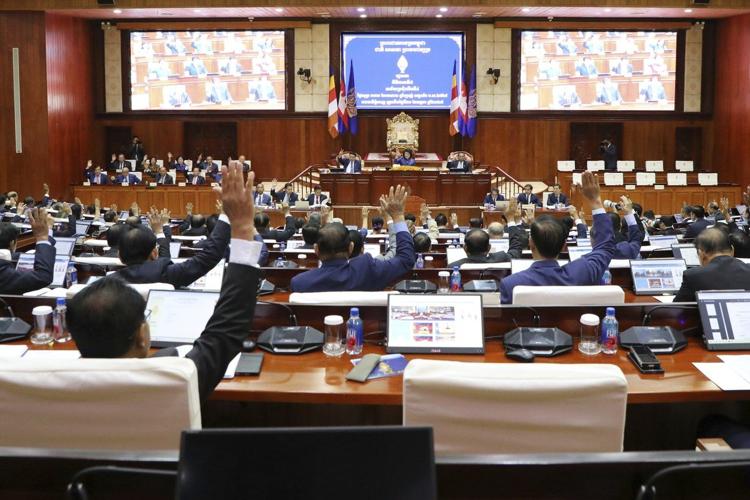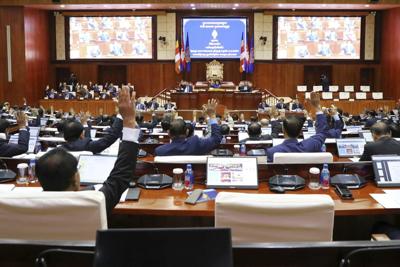PHNOM PENH, Cambodia (AP) ÔÇö Cambodian lawmakers passed a constitutional amendment that would allow the government to draft legislation seeking to revoke the citizenship of anyone found guilty of conspiring with foreign nations to harm the national interest.
The 125 members of National Assembly unanimously passed the proposal Friday and legally amended Article 33 of CambodiaÔÇÖs constitution, enabling the government to immediately draw up a bill allowing citizenships to be stripped for the first time.
The latest legal move by supporters of Prime Minister was viewed by critics as a way to suppress internal dissent and eliminate policital opponents of his administration and the ruling Cambodian PeopleÔÇÖs Party.
The change would apply to lifelong Cambodian citizens, people with dual citizenship in Cambodia and another nation and people from other countries who have been granted Cambodian citizenship.
Some government critics and opposition politicians are known to have dual citizenship.
Justice Minister Koeut Rith said government officials will urgently draft a bill to revoke the citizenship of any individual found guilty of treason or collaborating with foreign entities to seriously harm the interests of Cambodia and its people.
He claimed some Cambodians have colluded with a foreign country to harm their nation’s interests. The comment appeared to be a reference to between the armed forces of Cambodia and Thailand in which one Cambodian soldier was killed in a relatively small, contested area on the border.
ThailandÔÇÖs Constitutional Court from office earlier this month pending an ethics investigation over a leaked phone call about the border dispute with Cambodian Senate President , the influential former prime minister and father of Hun Manet. The leaked phone call in Thailand as Paetongtarn faces growing dissatisfaction over her handling of the conflict.
Last month Cambodia submitted an official request to the International Court of Justice in The Hague to resolve the ongoing border dispute involving several ancient temple sites.
The consitutional amendment in Cambodia comes after Hun Sen last week called for the Ministry of Justice to explore legal avenues in response to frequent government criticism by opposition figures. Hun Sen and Hun Manet both said the legal change was necessary, comparing it to similar laws in several other countries.
Speaking to villagers and government officials last week in northern Kampong Thom province, Hun Manet claimed that among nearly 200 United Nations member states, 150 countries have laws allowing citizenship revocation, including the United States.
ÔÇťPlease donÔÇÖt be concerned if you are a patriot and do not oppose the interest of country. But if you have conspired with foreign powers to destroy Cambodia then, yes, it is true you should be worried, and in such case you are not a Cambodian.ÔÇŁ Hun Manet said. ÔÇťNo true patriot would ever plot with foreign powers to destroy their nation.ÔÇŁ
Amnesty International said it was deeply concerned the Cambodian government will use the ÔÇťrepressive amendmentÔÇŁ to render its critics stateless.
ÔÇťJudicial independence is key to safeguarding peopleÔÇÖs rights including the right to nationality and reversing a culture of impunity. This has enabled the governmentÔÇÖs authoritarian practices to continue unchecked, such as its persecution of opposition leaders, activists and independent journalists,ÔÇŁ Regional Research Director Montse Ferrer said in a statement.
Former opposition leader Sam Rainsy was one of those named by Hun Sen as making comments detrimental to the nation.
Rainsy for decades has been a harsh critic and one of the most popular opponents of the Cambodian PeopleÔÇÖs Party, which fueled Hun Sen’s rise to power. Rainsy has been in exile since 2016 to avoid serving prison sentences on defamation, treason and other charges, which his supporters consider politically motivated.
Rainsy said recent comments by Hun Sen about the border dispute with Thailand were not patriotism but a personal and political reaction rooted in fear and panic over the potential collapse of a regime deeply entangled with international criminal networks.
ÔÇťHun SenÔÇÖs anti Thai rhetoric is nothing more than a political smokescreen. While he presents the dispute as one of historical grievance and national dignity, the real motive behind his indignation is ThailandÔÇÖs concerted effort to dismantle Chines-run cyber-scam operations based in border areas ÔÇö operations that have become a vital source of illicit funding for the current Phnom Penh regime,ÔÇŁ Rainsy said in a June 28 online post.




























